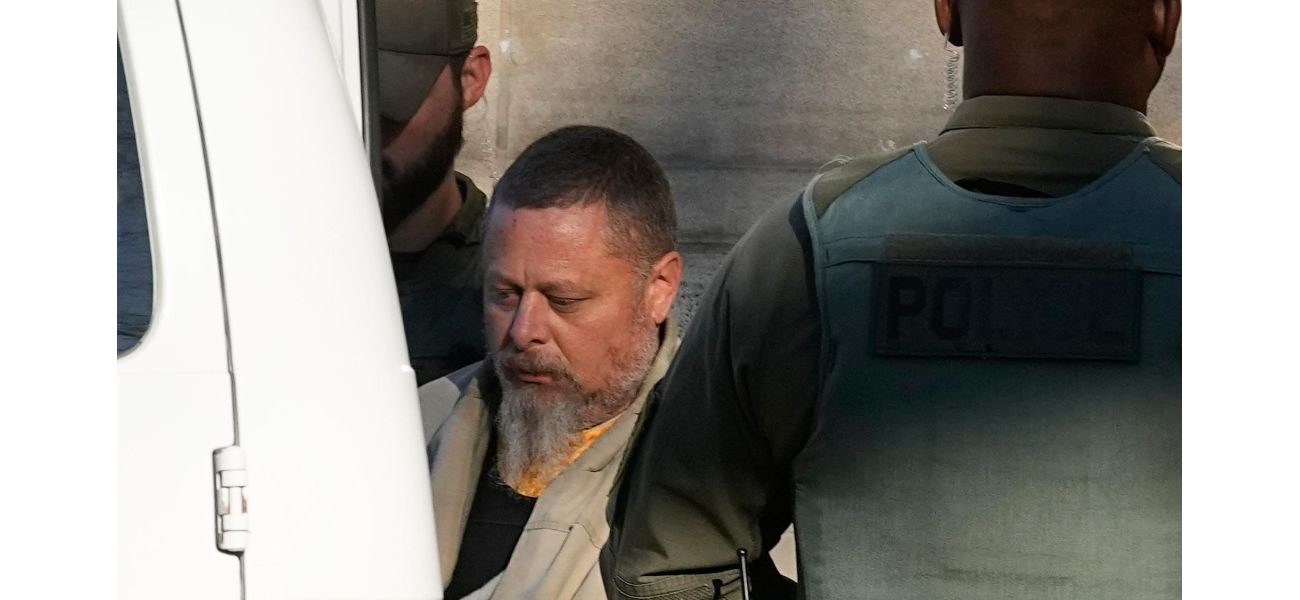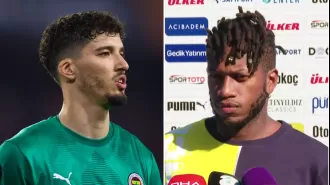Man from Indiana gets 130 years in jail for murdering two teen girls in 2017.
Indiana man sentenced to 130 years in prison for killing two teenage girls who disappeared during a winter hike in 2017.
December 21st 2024.

A devastating tragedy rocked the small town of Delphi when two young girls, Abigail Williams and Liberty German, disappeared while on a winter hike in 2017. The case remained unsolved for years, casting a dark shadow over the community. But finally, justice has been served as the man responsible for their murders, Allen, was sentenced to a maximum of 130 years in prison on Friday.
The 52-year-old was convicted on November 11th of two counts of murder and two counts of murder while committing or attempting to commit kidnapping. The special judge in the case, Fran Gull, imposed the maximum sentence of 65 years for each count, to be served consecutively. The emotional sentencing hearing lasted less than two hours and included victim impact statements from six relatives of the girls.
After the hearing, one of Allen's defense attorneys, Jennifer Auger, expressed her condolences to the families of the victims. She also stated that they plan to appeal and seek a new trial. However, she acknowledged that this was not the time for a detailed statement.
The Associated Press reached out to Allen's attorneys for additional comment on his sentence and their plans for an appeal but did not receive a response. Allen, who maintained his innocence throughout the trial, faced a possible sentence of 45 to 130 years for the brutal murders of Abby and Libby. The girls' throats were cut and their bodies were found in a wooded area, one day after they went missing during a day off from school.
The shocking news of Allen's arrest in October 2022, more than five years after the girls' deaths, sent shockwaves through the community. He was even employed as a pharmacy technician at a pharmacy just blocks from the county courthouse where he stood trial. The trial itself was filled with twists and turns, including repeated delays, a leak of evidence, and the withdrawal and reinstatement of Allen's public defenders by the Indiana Supreme Court.
The highly publicized case has garnered attention from true-crime enthusiasts, but with Gull's gag order lifted after the sentencing, police and prosecutors held a news conference to thank the investigators who worked tirelessly to bring Allen to justice. Carroll County Sheriff Tony Liggett stated that there was no doubt that justice had been served and thanked a retired state government worker, Kathy Shank, who volunteered to help organize tips received as part of the investigation.
Shank's crucial discovery, a misplaced "lead sheet" that identified a man who had been on the trail the afternoon the girls went missing, ultimately led investigators to Allen. Liggett expressed his gratitude to Shank for bringing this information to their attention and acknowledged that without her, they may not have been able to solve the case.
During the news conference, German's grandfather, Mike Patty, thanked the jury, investigators, prosecutors, and Gull for their dedication to seeking justice for Abby and Libby. As a photo of the girls, smiling in their winter gear, was projected behind him, Patty stated that justice had been served for the girls.
Gull, the special judge who oversaw Allen's trial, was from the same county as the jury. The seven women and five men were sequestered throughout the trial, which began on October 18th in Delphi, the girls' hometown of about 3,000 residents, located 60 miles northwest of Indianapolis.
The trial was not without its challenges, as it faced repeated delays and the withdrawal and reinstatement of Allen's public defenders. The case also garnered attention from the public due to its tantalizing evidence. The girls were dropped off at a hiking trail just outside of Delphi on February 13th, 2017, but never made it to their agreed pickup location. Their bodies were found the next day, near an abandoned railroad trestle they had crossed.
In his closing arguments, Carroll County Prosecutor Nicholas McLeland painted a chilling picture of Allen forcing the girls off the hiking trail at gunpoint, with the intention of raping them. However, a passing van caused him to change his plans and instead, he brutally cut their throats. McLeland presented evidence, including an unspent bullet found between the girls' bodies, which was linked to Allen's handgun by a state police firearms expert.
McLeland also referenced a grainy cellphone video recorded by German, which showed a man following the girls across a bridge. He argued that the man's voice, heard on the video telling the girls to "down the hill," belonged to Allen. The prosecutor also played recordings of Allen confessing to the murders to his wife and in writing, stating, "I did it. I killed Abby and Libby."
But Allen's defense team argued that these confessions were unreliable due to his severe mental health crisis while in isolation, being watched 24 hours a day, and taunted by other inmates. They presented a psychiatrist who testified that months in solitary confinement could cause a person to become delirious and psychotic.
Defense attorney Bradley Rozzi also pointed out that no witness explicitly identified Allen as the man seen on the hiking trail or the bridge the day the girls went missing. He also noted that there was no fingerprint, DNA, or forensic evidence linking Allen to the crime scene. These arguments ultimately proved unsuccessful, as Allen was found guilty and sentenced to the maximum penalty for his horrific crimes.
The small town of Delphi can finally find closure and begin to heal from this tragic event, knowing that justice has been served for Abby and Libby.
The 52-year-old was convicted on November 11th of two counts of murder and two counts of murder while committing or attempting to commit kidnapping. The special judge in the case, Fran Gull, imposed the maximum sentence of 65 years for each count, to be served consecutively. The emotional sentencing hearing lasted less than two hours and included victim impact statements from six relatives of the girls.
After the hearing, one of Allen's defense attorneys, Jennifer Auger, expressed her condolences to the families of the victims. She also stated that they plan to appeal and seek a new trial. However, she acknowledged that this was not the time for a detailed statement.
The Associated Press reached out to Allen's attorneys for additional comment on his sentence and their plans for an appeal but did not receive a response. Allen, who maintained his innocence throughout the trial, faced a possible sentence of 45 to 130 years for the brutal murders of Abby and Libby. The girls' throats were cut and their bodies were found in a wooded area, one day after they went missing during a day off from school.
The shocking news of Allen's arrest in October 2022, more than five years after the girls' deaths, sent shockwaves through the community. He was even employed as a pharmacy technician at a pharmacy just blocks from the county courthouse where he stood trial. The trial itself was filled with twists and turns, including repeated delays, a leak of evidence, and the withdrawal and reinstatement of Allen's public defenders by the Indiana Supreme Court.
The highly publicized case has garnered attention from true-crime enthusiasts, but with Gull's gag order lifted after the sentencing, police and prosecutors held a news conference to thank the investigators who worked tirelessly to bring Allen to justice. Carroll County Sheriff Tony Liggett stated that there was no doubt that justice had been served and thanked a retired state government worker, Kathy Shank, who volunteered to help organize tips received as part of the investigation.
Shank's crucial discovery, a misplaced "lead sheet" that identified a man who had been on the trail the afternoon the girls went missing, ultimately led investigators to Allen. Liggett expressed his gratitude to Shank for bringing this information to their attention and acknowledged that without her, they may not have been able to solve the case.
During the news conference, German's grandfather, Mike Patty, thanked the jury, investigators, prosecutors, and Gull for their dedication to seeking justice for Abby and Libby. As a photo of the girls, smiling in their winter gear, was projected behind him, Patty stated that justice had been served for the girls.
Gull, the special judge who oversaw Allen's trial, was from the same county as the jury. The seven women and five men were sequestered throughout the trial, which began on October 18th in Delphi, the girls' hometown of about 3,000 residents, located 60 miles northwest of Indianapolis.
The trial was not without its challenges, as it faced repeated delays and the withdrawal and reinstatement of Allen's public defenders. The case also garnered attention from the public due to its tantalizing evidence. The girls were dropped off at a hiking trail just outside of Delphi on February 13th, 2017, but never made it to their agreed pickup location. Their bodies were found the next day, near an abandoned railroad trestle they had crossed.
In his closing arguments, Carroll County Prosecutor Nicholas McLeland painted a chilling picture of Allen forcing the girls off the hiking trail at gunpoint, with the intention of raping them. However, a passing van caused him to change his plans and instead, he brutally cut their throats. McLeland presented evidence, including an unspent bullet found between the girls' bodies, which was linked to Allen's handgun by a state police firearms expert.
McLeland also referenced a grainy cellphone video recorded by German, which showed a man following the girls across a bridge. He argued that the man's voice, heard on the video telling the girls to "down the hill," belonged to Allen. The prosecutor also played recordings of Allen confessing to the murders to his wife and in writing, stating, "I did it. I killed Abby and Libby."
But Allen's defense team argued that these confessions were unreliable due to his severe mental health crisis while in isolation, being watched 24 hours a day, and taunted by other inmates. They presented a psychiatrist who testified that months in solitary confinement could cause a person to become delirious and psychotic.
Defense attorney Bradley Rozzi also pointed out that no witness explicitly identified Allen as the man seen on the hiking trail or the bridge the day the girls went missing. He also noted that there was no fingerprint, DNA, or forensic evidence linking Allen to the crime scene. These arguments ultimately proved unsuccessful, as Allen was found guilty and sentenced to the maximum penalty for his horrific crimes.
The small town of Delphi can finally find closure and begin to heal from this tragic event, knowing that justice has been served for Abby and Libby.
[This article has been trending online recently and has been generated with AI. Your feed is customized.]
[Generative AI is experimental.]
0
0
Submit Comment





